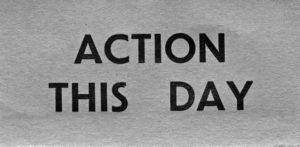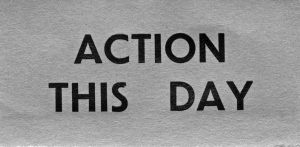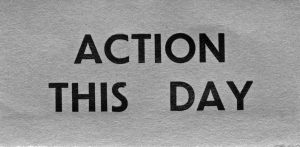Finest Hour 183
Working with Winston: The Unsung Women behind Britain’s Greatest Statesman
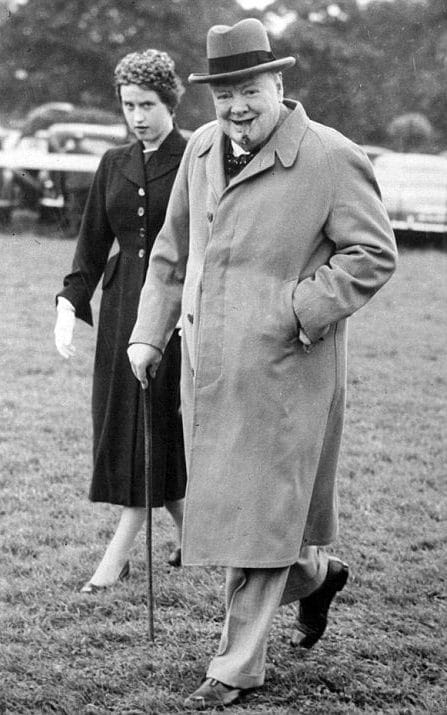
Jane Portal, secretary to Churchill 1949–55
May 23, 2019
Finest Hour 183, First Quarter 2019
Page 07
By Cita Stelzer
Cita Stelzer is author of Working with Winston: The Unsung Women behind Britain’s Greatest Statesman to be published this May and from which this article is adapted.
In the course of his long career, Winston Churchill published numerous histories (earning him the Nobel Prize for Literature) containing some thirteen million words. He also produced untold memoranda, letters, directives, and an estimated 5,000 speeches for delivery in the House of Commons and to audiences in Britain, America, Canada, the Soviet Union, and other countries, as well as over the wireless. When completed, The Churchill Documents, published by Hillsdale College, will consist of twenty-three hefty volumes. And those volumes do not include his published books. Without the help of his many talented and devoted personal secretaries, such an enormous, high-quality output would almost certainly have been impossible. Most of it was dictated to his teams of ever-present secretaries, some of it while in cars, planes, trains, and some of it while in bed at 8 AM or again after dinner until 2 AM. Whether preparing to correspond with President Roosevelt, Joseph Stalin, or his wife Clemmie, or to transmit instructions to his generals, Churchill knew that the shout of “Miss” would instantly produce a young lady to “take down.”
Churchill was a non-stop worker, especially during the Second World War when he rigorously enforced his rule (a blessing for later historians) that every instruction, every thought, must be reduced to written memoranda to avoid confusion, or perhaps deliberate misinterpretation. This made accurate transcription of his words essential to his direction of Britain’s war effort. True, he did take an occasional afternoon off to paint except during the war, but even then it was the job of his secretaries to see to it that proper paints, brushes, and canvasses arrived wherever he might be when he found time to relax. And the blue paint requested was not just any blue, but often a specific hue, such as cobalt.
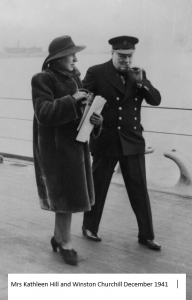
I call these women (and one man) “secretaries” only to use the job titles of their time. Today, women of equal talent and willingness to work would have grander titles in recognition of the complicated nature of the work they are doing. Georgina Hill, granddaughter of Kathleen Hill, one of Churchill’s secretaries to whom I devote a chapter in my book, vividly recalls conversations with her grandmother and tells me that “Even though her job title was ‘secretary,’ it is clear that the job involved much more than merely typing. Some of her functions included what we would understand in the modern political world as ‘chief of staff,’ ‘press secretary,’ ‘advisor,’ and ‘researcher.’”
These women played major administrative roles, not least among them organizing major international summits that brought together in often inaccessible places not only the principal players, but hundreds of military advisors in need of thousands of documents, secure communication facilities, food and—inevitably in those days—alcoholic refreshment. Not to mention accommodation for Churchill’s secretarial team. One young woman recalls how she had to line up among the generals in their robes, clutching sponge bags, all waiting to use the one bath at Yalta. But “secretaries” or “shorthand typists” is what they were called in Churchill’s day, even by themselves, and so I use that term.
Whether at Chartwell or in the Churchills’ flat in London, in his office in the Commons or Downing Street, he always had a personal secretary or two with him. Many of these “young ladies” as he called them, worked for him for decades and some, after retiring, voluntarily returned at times when their predecessors were overwhelmed with work. They all, without significant exception, adored him.
The Four Sources
Until now we have relied for our opinion of Churchill on three broad sources of information. The first of these is, of course, Churchill himself, who recorded his deeds during a long life that led him from cavalry charges to worrying about the atom bomb, and to political battles that included just about everything—the abdication, India’s status, Irish home rule, the rise of Hitler, to mention just a few.
The second source of information is the work of professional historians, most notably Sir Martin Gilbert in his eight-volume biography and associated documents volumes, and now Andrew Roberts monumental biography. Third, we have the diaries and recollections of men—and a few exceptional women—whom Churchill regarded either as equals or as people important for him to impress, or at least before whom displays of unpremeditated bad behaviour would not be in his interest.
During the preparation of my first book, Dinner with Churchill: Policy-Making at the Dinner Table (2013), I discovered that at the request of the ever-prescient Churchill Archives many of these women had recorded oral histories of their time working with Churchill. These provide a record of their daily experiences in the service of a famous, impatient, and multi-tasking (to use a word not in currency during Churchill’s years) man. They also capture the man as seen by a group from whom we have heard very little—these “young ladies” who worked for him and enabled him to lead such a productive life. He once joked he might need “two young ladies” for that night’s work which, of course, was taking down dictation.
The Functions
Churchill after all was producing an outpouring of words in an era before dictating devices he might have deemed adequate were available, making him dependent on changing teams of private secretaries/shorthand typists who devoted their lives and careers to managing the “torrent of dictated notes…comments, questions and requests” and the vast volume of his private correspondence. One secretary was charged with final negotiations of contractual arrangements for his multi-volume histories that sold more copies than those by any other twentieth-century historian. Another example: one secretary acting as Churchill’s accountant analysed his expenses and, when finances pinched the households, advised reducing expenditure on champagne—an economy that lasted two days.
Others helped Mrs. Churchill select household staff. Still others arranged for the care of his houses, horses, pets, selected after-dinner films for viewing by him and his guests, and made complicated arrangements for hundreds of thousands of miles of travel. One secretary typed Churchill’s article on the death of King George V while on a Moroccan train and arranged to have it cabled through Paris and on to London to meet a newspaper’s deadline. No line was drawn between taking dictation and walking the dogs, feeding the fish, or helping Churchill to prepare for bed. Unanticipated demands were to be met without discussion, no matter the resulting personal inconvenience. A sudden Churchill decision on Christmas Eve to leave for Athens—immediately— was taken in stride.
These women served him through his Wilderness Years before the Second World War, during the triumphs and tragedies of his years in government, during his country’s darkest and finest hours, and during his long search for lasting peace in the years of the Cold War. They saw him when he woke in the morning and went to bed the following morning and all hours in between, since he was determined never to be without a secretary should he want to commit his thoughts and commands to paper instantly. Churchill wanted what he wanted when and where he wanted it and was not embarrassed to make unusual requests. The young ladies were with him, pad, pencil, and at times typewriters at hand when he was building a wall at his beloved Chartwell; at the races cheering his horses to victory (some tell of betting a few bob on his horses); on a trip to Moscow in October 1944 when he had to face an angry Stalin; and while he was negotiating a truce in the Greek civil war, with shells flying around them.
One secretary travelled with him to Fulton, Missouri, to work on his speech warning of the descent of an Iron Curtain across Europe. On the train to Fulton, she was surprised to be invited into the bathroom by President Truman’s doctor and offered a pick-me-up whisky from his flask, Missouri being a “dry” state. She refused and retained her aplomb. Churchill of course had a different response.
Skills-a-Plenty
In short, these women were supremely qualified to provide insight into how Churchill was able to accomplish as much as he did, and what Churchill revealed of himself when in full flow of working.
All were highly intelligent and superbly organized. In an age when educational opportunities were not widely available to women, many were well trained at highlevel secretarial colleges. All knew how to spell the words in Churchill’s enormous vocabulary, or at least most of them most of the time. All were capable of coping with dictation from a man who often insisted they do so under trying conditions, and who relied on them to edit as he dictated. Trying conditions included his minor lisp, his cigar clenched between his teeth, and his habit of trying out phrases in a low tone to see how they sounded to him.
Listening to the recordings of their tales of working with Churchill, I was impressed by their command of the language, both its range and its “music,” as Kathleen Hill, a part-time violinist while in India before returning to work in Britain, called it when describing Churchill’s speeches. All jumped at the opportunity to trot off to the library to fetch books he requested or ones they thought he might enjoy. All had excellent memories, helpful in coping with his myriad and varied requests. And their recollections make listening to the oral histories a joy.
What a few of the youngest did not have was Churchill’s command of history and some, being quite young, knew little of the speeches he had delivered before many of them became adults—something their boss at times found truly incredible and rather annoying when this gap in their knowledge interfered with their ability to take down dictation that included references to earlier speeches.
Special Qualities
You can hear in the voices of Churchill’s former secretaries the self-confidence that allowed them to serve without being servile; to ask Mrs. Churchill to intervene when her husband was being most unreasonable; and to prepare a jokey request for nylons, chocolates, and cosmetics during rationing. They knew how to remain poised and able to work when confronted with a boss in his bed or his bath, military officers in the room or on the phone, dogs and cats roaming around, a budgie perching on their heads, cigar smoke billowing, and telephones ringing. They ignored the Savoy Hotel ice bucket in the corner by the bed that Churchill used as a spittoon. It was this self-confidence that permitted them to endure a rather unnerving initiation Churchill developed to test those he was admitting to what he called his “Secret Circle.”
I was also impressed by the shrewdness of the observations of their boss and enchanted by the good nature with which they told their tales, chuckling at the recollection of amusing events or Churchill’s quick wit; their sweetness of tone when calling him, as they almost all did—but not to this face, of course—“The Old Man.” Notable too is the lack of animosity when describing how Churchill’s driving ambition and work habits often made their personal lives difficult. Many remained friends with each other for life, having shared the excitement of working for Winston Churchill.
These women lived in a time very different from our own, in marked contrast with today’s sharp demarcation between secretarial chores and fetching coffee. They understood and accepted the social and class distinctions characteristic of the employer-employee relationship. Late-night work rarely resulted in an invitation to dine with the family or Churchill’s guests, even though the secretaries would have to wait until after dinner and the inevitable round of brandy, cigars, and films concluded before they could resume work with him. They were, however, invited to watch the films, and many recorded his reactions and comments.
The secretaries understood when to allow the Churchill family its privacy and when to fade into the background if photographers were present. They understood the need for discretion, and not only in wartime when the importance of absolute secrecy was made clear to them. They were privy to all the great secrets of the war, including all the details of the planning and date for D-Day. They knew the sort of dress appropriate to an office: no need to make a dress code explicit, except for a warning that white gloves were in order when meeting royalty. There were, inevitably, gaps in their knowledge. One secretary learned the hard—but hilarious—lesson of what happens when you iron velvet.
And, of course, they were top-notch stenographers and typists, crucial when working for a man who “could talk a book better than write one and he often got through three or four thousand words a day.”
Offstage
And they were drawn from a work pool of women with similar values and expectations. Yes, some of these women were brought up overseas, some came from homes on the upper end of the middle class, and some were less fortunate. But all seemed to feel comfortable working with each other—no back-biting, no begging off assignments deemed unpleasant. In such cases trades could easily be worked out with colleagues with different preferences in order that Churchill’s work could be accomplished seamlessly. Indeed, cooperation was so smooth that to Churchill these women were almost interchangeable parts. He generally cared very little which secretary responded to his loud call “Miss,” so long as it was a familiar face. Over the years, in and out of office, in war and in peace, he maintained his work habits and schedule unchanged—it was his staff, not Churchill, that did the adapting.
As early as 1941 some of these secretaries were recognized by the monarch and awarded the MBE. Others later received various honours for sacrificing “normal” lives in order to help support Churchill in his multiple endeavours, especially during the war. And in lieu of or in addition to honours, an impish grin or a “beatific” smile was thanks enough.
In telling us what it was like to work with Churchill, these special women also tell us much about the man that we have not yet learned from his self-descriptions or from reports of those colleagues to whom he had reason to defer. Through the eyes of Churchill’s young ladies, we see revealed a consummate actor “offstage” and not under the glare of a public spotlight. We also see Churchill when he was not in a setting in which his behaviour could shape what historians might say about him. These witnesses add a good deal to what we know about Churchill, whom the late Charles Krauthammer called “the indispensable man.”
Subscribe
WANT MORE?
Get the Churchill Bulletin delivered to your inbox once a month.

